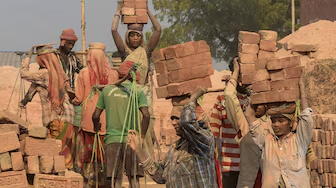
India-Pakistan Tensions: Border Area Workers Wait and Watch
The recent escalation in India-Pakistan tensions has cast a long shadow over the lives of workers in border areas. From agricultural laborers in Punjab to industrial workers in Jammu and Kashmir, many have found themselves caught between the demands of their livelihoods and the looming threat of conflict. As ceasefires are declared and diplomatic talks unfold, the question remains: will these workers return to their posts, or has the fear of instability driven them away for good?
The Exodus: Workers Flee Amidst Rising Tensions
In the wake of escalating hostilities, thousands of migrant workers from states such as West Bengal, Bihar, Odisha, and Uttar Pradesh have fled from regions like Jammu & Kashmir, Punjab, Haryana, and Gujarat. Their departure has significantly impacted industries in these areas, particularly in hotel operations and industrial hubs in Jammu & Kashmir, as well as engineering and textile units in other states that heavily rely on migrant labor. Employers do not anticipate the workers’ immediate return, leading to disruptions in various sectors.
Similarly, in Ludhiana, Punjab, the usual influx of migrant laborers for paddy cultivation has been near zero. Many existing migrant workers have returned to their home states, fearing the outbreak of war. This exodus is beginning to take a toll on agriculture in Punjab, disrupting farm labor and threatening the state’s agricultural activities.
The Uncertainty: Workers Who Stayed Behind
For those who remained, life has been marked by uncertainty and vigilance. In border districts like Pathankot, Gurdaspur, Taran Taran, Amritsar, Ferozepur, and Fazilka, workers continue to monitor the situation closely. Despite the ceasefire between India and Pakistan on May 10, 2025, many are hesitant to return to their workplaces. The fear of sudden escalations and the possibility of renewed conflict have kept them on edge.
Local leaders have called for special economic packages to support these border districts, acknowledging the economic and social disruptions caused by the recent escalations with Pakistan. Proposals include forming Village Defence Committees within 5 km of the India-Pakistan border, training local youths in arms handling to support police and paramilitary forces, and providing monthly stipends to these volunteers.
The Human Cost: Personal Stories Amidst the Crisis
Amidst the broader economic and political implications, the personal stories of individuals offer a poignant glimpse into the human cost of the conflict. Reshma Ingle, a Border Security Force (BSF) constable from Borgaon Peth village in Amravati district, demonstrated immense courage and patriotism by answering the call of duty amid escalating tensions at the India-Pakistan border. She left her one-year-old son behind during a short leave, returning to her post at the Amritsar border after all leaves were canceled. Despite the emotional farewell and her son’s distress, Reshma reaffirmed that “the nation comes first, family later,” expressing hope that her son will one day be proud of her sacrifice.
In another instance, BSF Constable Purnam Kumar Shaw, who accidentally crossed into Pakistani territory in the Ferozepur sector of Punjab on April 23, 2025, was repatriated by Pakistan Rangers on May 14 at the Attari-Wagah border. The handover occurred peacefully, and Shaw appeared well upon his return, showing no signs of mistreatment.
The Way Forward: Rebuilding Trust and Stability
As the situation stabilizes, the focus must shift to rebuilding trust and ensuring the safety and well-being of workers in border areas. Economic incentives, coupled with security assurances, can encourage workers to return to their posts. Additionally, fostering dialogue between communities on both sides of the border can help bridge divides and promote lasting peace.
The resilience of border area workers is commendable, but their challenges are far from over. It is imperative that both governments and international organizations collaborate to address the socio-economic impacts of the conflict and work towards a peaceful and prosperous future for all.
